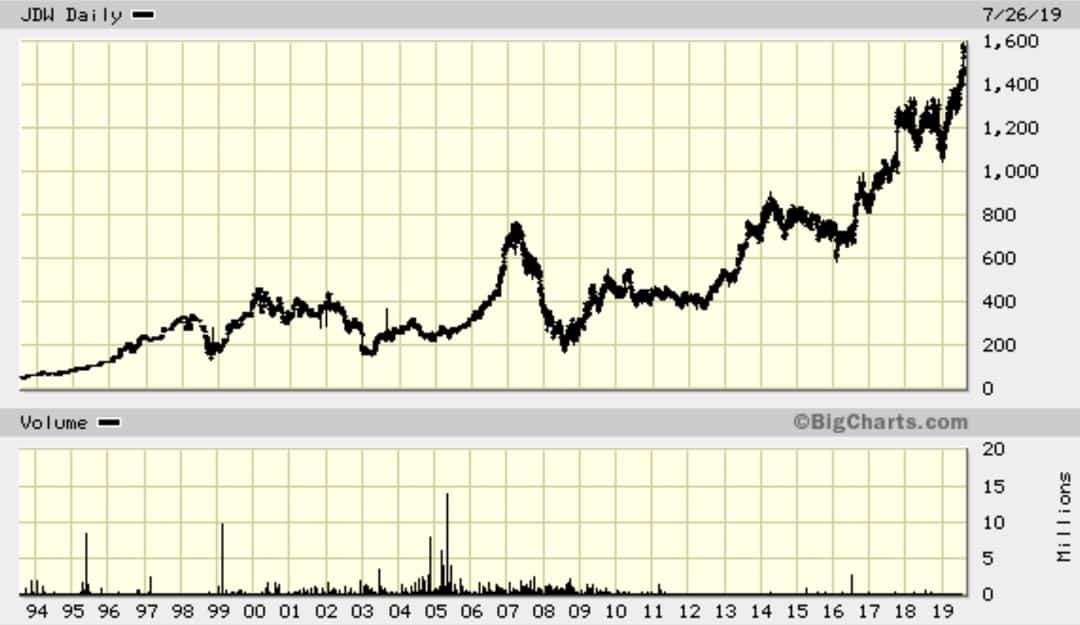Metals Exploration’s share price has gone vertical. What’s the key lesson, and which three stocks might be next?
This brexiteering pub chain is sky-rocketing – here is why
JD Wetherspoon isn't a brand that overly many outside of the UK would have heard of.
The British pub chain did make a lot of headlines in recent years, though. Repeatedly, the company printed hundreds of thousands of beer mats with pro-Brexit messages, e.g., setting out why the IMF is comparable to FIFA. International media loved reporting about Wetherspoon as what they saw as one of the typical quirks of a Britain gone mad. Many bashed the company's Chairman, Tim Martin, for utilising his dinner tables and bar counters for promoting his political views.
They should have instead reported about the investment angle of the company created by Martin. Few have had this on their radar screen, but Wetherspoon is one of the country's most outstanding investment success stories.
The stock is up more than 50 times since 1992. That's an annual return of 16% p.a. for 27 years running.
It's up 130% since the Brexit referendum and up 45% since the start of this year. It has beaten the performance of the FTSE index by leaps and bounds.
Tim Martin's personal success is also up quite a bit. The net worth of the company's Chairman, who started his career working on construction sites and then went on to sell newspapers, is now worth a cool GBP 500m.
Here is why Martin and his co-shareholders are likely to remain on the up, at least when you look at it from a long-term perspective.

It's been up, up and up further for JD Wetherspoon shareholders
What Ryanair did for flying, Wetherspoon did for evenings out
Wetherspoon pubs have long been a by-word for cheap evenings out. If you want to get drunk at the lowest possible cost, you go to "spoons" or "wethers" as the chain is often referred to.
Indeed, Martin has learned a lot from the world's no. 1 cost cutting and consumer champion. He is said to be a disciple of Sam Walton, the founder of Walmart. Walton built his retail chain on the premise of wanting to offer consumers the best possible price, and subsequently made his family one of the richest in the world.
Think of Wetherspoon pubs what you may, but Martin has succeeded in building an enormous success story in an otherwise shrinking market. Since 2001, 25% of Britain's pubs have closed down. Wetherspoon has been bucking that trend. The chain has been growing not just its number of pubs, but also its sales per pub.
Most recently, the company made a lot of headway in offering food. Once known for the worst pub grub imaginable, the company now hosts themed special offers for different weekdays: Steak Club on Tuesday, Chicken Club on Wednesday, Curry Club on Friday, Fish & Chips Club on Saturday, and brunch on Sunday. Similar to what Aldi has achieved in grocery shopping, you nowadays can spot Range Rovers and BMW's outside of Wetherspoon pubs. Everyone likes a bargain! By opening in the morning and offering breakfast, Wetherspoon has also started to take a bite out of some of the UK's café chains.
Remarkably, the company is also much loved by its employees. Of Wetherspoon's 40,000 employees, 12,000 are shareholders. Its pub managers have been with the company an average of 12 years, and its kitchen managers for an average of eight years. The latter is particularly miraculous, given that restaurant kitchens are infamous for high turnover. For 16 years running, Wetherspoon has been named as one of the top employers of the country. Employees get paid more than what the law would require Wetherspoon to pay.
Similar to Sam Walton, Martin visits at least 15 of his pubs every week. He tastes the beer (but doesn't drink it), takes notes, and thanks the staff for their efforts and their feedback.
With his fairly simply formula, the Belfast-born entrepreneur has built up a veritable cash machine. Indeed, it's primarily the company's free cash flow that has started to make the stock a topic of discussion among value investors.
A low growth market but there is no lack of cash flow
In his reporting to investors, Martin prominently points out the free cash flow per share. Whereas many other CEOs try to bamboozle their shareholders with some accounting wizardry based on a cleverly construed "profits before costs"-style nonsense, at Wetherspoon the opposite is done. Free cash flow per share is about the most objective and relevant figure any shareholder can get served up.
Martin is on a relentless quest to serve his customers in the best possible way AND maximise free cash flow from the operation. He sees the latter as a logical consequence of the former.
One of the side-benefits of this are the share buybacks that Wetherspoon has been able to carry out for years. Using some of the free cash flow, the company buys back its own stock and cancels it. This increases the percentage stake of all remaining shareholders. Since 2006, Martin's stake has increased from 21.2% to 31.9% as a result of these buybacks.
The outstanding long-term performance has recently started to attract more attention, no doubt further fuelled by Tim Martin's increasing public profile due to his ongoing, passionate campaigning for Brexit. Through stunts such as replacing French champagne with Australian and New Zealand sparkling wine, Martin regularly triggered Britain's Remainer media and generated many millions of free PR both for himself and his company.
Word is now spreading among investors, too. Chris Mayer, one of the world's most interesting value investors and market observers, recently wrote about JD Wetherspoon on the blog of his family office, Woodlock House Capital. He had picked up on the ongoing reporting that HollAnd Advisors, an investment management firm based in London, had done about Wetherspoon stock.
Does it have yet further to run?
Mayer believes the stock is currently priced a tad too high for him to get excited, and his assessment is always worth listening to. But there are plenty of reasons to keep this company on your radar screen. If or when the stock hits a weak period, it could be time to pounce.
There are, after all, some powerful figures at the very foundation of this investment case. When looking at it from a multi-decade perspective, Wetherspoon could still be in the infancy of its success.
Huge long-term potential
The UK has more than 38,000 pubs, giving Wetherspoon a market share of only about 2.3%. Its market share is even smaller if you compare it to the overall market for dining out. There is plenty of room for the company to grow in its home market by claiming a larger share of the overall market.
Also, Wetherspoon has so far not even attempted to take its concept and brand to overseas markets. Martin once joked that if he opened a pub for every 30,000 citizens of China, he'd be richer than Bill Gates. Though he was serious about saying that Italy and France might lend itself to a foray abroad. For now, though, Wetherspoon has plenty of untapped potential at home.
At just 64 years of age, Martin should have many years left during which to apply his vast experience in growing this company. Or, should he ever choose to retire, he could carry out a slightly dirty, but highly profitable corporate manoeuvre that founders regularly apply ahead of their exit. Nothing would stop Martin from gently upping his famously low prices to maximise the company's short-term profits and cash flow – possibly to pretty it up for a lucrative sale to a large conglomerate. If that was done, the chart of Wetherspoon stock could go up in an even steeper curve than recently.
Though a more likely – and more likable – approach would be to use the Wetherspoon brand and concept for something similar than what Starbucks, McDonald's, and Pret a Manger have done. Build a global brand and make it truly big. Just like Sam Walton, he has four children. With a bit of luck, one of his offspring will be interested in continuing the family business.
Based on everything that is known about Martin, the idea of eventually building a global chain will probably appeal to him the most.
With this in mind, I have also added JD Wetherspoon stock to my list of shares I'd love to own if or when a market crash brings down its valuation. This could be similar to buying McDonald's or Starbucks stock decades ago.
Until this stock is available at the right price, I'll try to save up some money by eating out at "spoons" when I am passing through London.
Did you find this article useful and enjoyable? If you want to read my next articles right when they come out, please sign up to my email list.
Share this post:
Get ahead of the crowd with my investment ideas!
Become a Member (just $49 a year!) and unlock:
- 10 extensive research reports per year
- Archive with all past research reports
- Updates on previous research reports
- 2 special publications per year







